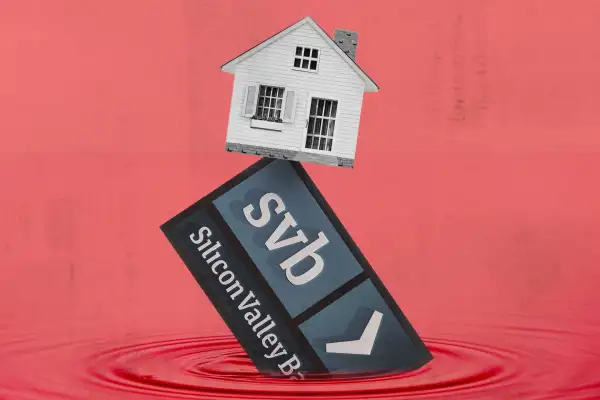‘A Whole New Level of Uncertainty’: How the Silicon Valley Bank Collapse Could Affect Mortgage Rates

News of the recent Silicon Valley Bank and Signature Bank collapses have sparked fears that a string of similar failures may be forthcoming. But there could be a silver lining for potential homebuyers, as the upheaval caused by the banks’ implosion could cause a shift in mortgage rate trends.
The bank failures have “introduced a whole new level of uncertainty into the economy,” Lisa Sturtevant, chief economist at real estate firm Bright MLS, said in an emailed statement.
That uncertainty could affect mortgage rates in one of two ways.
Mortgage rates could fall, depending on the Fed
On the one hand, a perceived weakness in the financial sectors could cause the Federal Reserve to alter its monetary policy in regard to inflation.
For months, the U.S. central banking system has been laser-focused on bringing inflation, which reached a high of 9.1% last June, back down to a target range of 2% in the long run (it currently sits at 6%). To achieve this goal, the Fed has implemented a series of increases in the federal funds rate, essentially bringing it from 0% in early March 2022 to 4.5%-4.75% now.
The federal funds rate is the rate banks charge each other to borrow money overnight and doesn’t directly impact mortgage rates. Increases do, however, increase the cost of borrowing on all kinds of credit, including home loans — which is why mortgage rates more than doubled last year.
Until last week, it was widely anticipated among experts that the Fed would approve an additional rate hike of 0.50% when it meets next week. But now, given SVB and Signature Bank’s collapse, there is a growing sense among market analysts that the Fed will change course. It could opt to either pause rate hikes completely or implement a smaller rate hike of 0.25%.
“If the Fed does dial back on planned rate increases, it will be a signal that they see weakness in the financial sector and the broader economy,” Sturtevant said. And if the Fed stops or slows the rate of increase in short-term rates, mortgage rates are likely to stabilize or even fall.
Rates could move with Treasury yields
That perceived financial weakness could also lead to the second way mortgage rates may be impacted. In times of economic uncertainty, investors tend to shy away from riskier investments like stocks and seek the relative safety of Treasury bonds. The 10-year Treasury yield in particular will influence how mortgage rates move.
Changes in 10-year Treasury yields don’t directly affect mortgage rates, but there is a correlation between the two: When yields increase, mortgage rates tend to increase. When yields fall, so do rates. Typically, mortgage rates tend to run between 1.8 and 2 percentage points higher than the 10-year yield.
There has already been an effect on daily mortgage rates in the wake of last week’s banking collapses. Yields on the 10-year Treasury dropped from close to 4% last Wednesday to just above 3.5% on Monday before rebounding slightly on Tuesday. Mortgage rates also dropped at the end of last week.
The full effect, if any, of this slide in rates will be seen when Freddie Mac releases its benchmark rate data on Thursday.
Lower mortgage rates could help buyers
Lower mortgage rates can make it easier for potential buyers to navigate the upcoming spring buying season.
Homebuyers have been very rate-sensitive so far this year. In January, the rate on a 30-year fixed-rate mortgage dropped by nearly one full percentage point, triggering an increase in buyer activity welcomed by a housing market that had been nearly dormant during the last half of 2022.
However, the lower-rate trend reversed in February, with rates edging closer to 7% as recently as early last week. Now, if rates do slide, experts believe buyers will once again become active in the market.
“Falling mortgage rates could thaw what was shaping up to be a fairly frozen spring home shopping season,” Skylar Olsen, chief economist at Zillow, said in a Tuesday statement. “A sustained rate drop will be a welcome boost to affordability.”
Olsen added that there are still pitfalls for some buyers. If problems in the banking sector spread beyond SVB and Signature Bank and end up being indicative of wider economic issues, the chances of a deeper and longer-lasting recession than anticipated increase. Tech-heavy and other housing markets affected by layoffs will likely see a downturn regardless of where mortgage rates are headed.
That could lead to another pullback from buyers unable to afford a home purchase, as well as a likely decrease in home values.
More from Money:
Buyers and Sellers Agree: The Housing Market is Pretty Rough Right Now
What the Silicon Valley Bank Collapse Means for You (Even if You Don’t Have Money There)
Are Your Bank Deposits Covered by FDIC Insurance? Here’s How to Know
